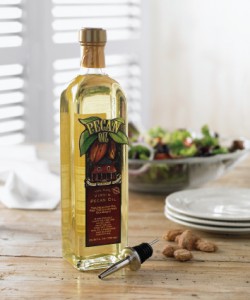 Many considerations take place when deciding which cooking oil to use for food preparation: saturated fat content, flavor potency, versatility, and overall delectability. If a cook is mindful of fat content, both “good” and “bad” fat, the observant epicurean will notice pecan oil has one-third less saturated fat than olive oil. When compared to butter, it has two-thirds less saturated fat. From a fat standpoint, pecan oil looks pretty skinny.
Many considerations take place when deciding which cooking oil to use for food preparation: saturated fat content, flavor potency, versatility, and overall delectability. If a cook is mindful of fat content, both “good” and “bad” fat, the observant epicurean will notice pecan oil has one-third less saturated fat than olive oil. When compared to butter, it has two-thirds less saturated fat. From a fat standpoint, pecan oil looks pretty skinny.
Perhaps pecan oil’s “thinness” in fats provides room to absorb the food’s flavoring rather than reducing a food’s notable, savory qualities. Its light, neutral character contains no artificial flavorings and is 100% virgin oil. Overall, pecan oil contains a light, buttery taste – without the butter – and maintains flavor-neutrality. It allows a food’s flavors to dominate the aromas and tastes by not competing in the pan.
Pecan oil’s versatility ranges from baking, sautéing, salad dressing, grilling, and deep frying. It functions as a butter substitute in baking and produces a delectably moist item due to its finer oil quality. Similarly, grillers coat meat with pecan oil to prevent meat from drying out on the pit in order to preserve moisture. And yes, for those days when you are less concerned with the “skinny” of pecan oil, this versatile oil can fry up whatever crunchy, salty, delectable delights you and your fryer desire.
Tastefully speaking, pecan oil’s benefits are long lasting in the kitchen or in the backyard next to the grill due to its long shelf life. In order to extend the shelf life, it is best to refrigerate the oil once opened. Also, it is important to note pecan oil will not thicken in the refrigerator. Pecan’t go wrong with pecan oil.
